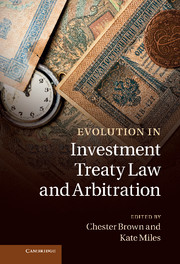Book contents
- Frontmatter
- Contents
- Contributors
- Editors' preface and acknowledgements
- Table of cases
- Table of Treaties
- Part I Introduction
- Part II Shifts in fundamental character
- Part III Actors in international investment law
- Part IV The new significance of procedure
- 15 The new rules on participation of non-disputing parties in ICSID arbitration: Blessing or curse?
- 16 The role of procedure in the development of investment law: The case of Section B of Chapter 11 of NAFTA
- 17 Navigating the parallel universe of investor–State arbitrations under the UNCITRAL Rules
- 18 The scope of ‘amount of compensation’ dispute-resolution clauses in investment treaties
- 19 Interference by a local court and a failure to enforce: Actionable under a bilateral investment treaty?
- 20 Bias challenges in investor–State arbitration: Lessons from international commercial arbitration
- Part V Engagement with cross-cutting issues
- Part VI Conclusions
- Index
- References
19 - Interference by a local court and a failure to enforce: Actionable under a bilateral investment treaty?
from Part IV - The new significance of procedure
Published online by Cambridge University Press: 05 December 2011
- Frontmatter
- Contents
- Contributors
- Editors' preface and acknowledgements
- Table of cases
- Table of Treaties
- Part I Introduction
- Part II Shifts in fundamental character
- Part III Actors in international investment law
- Part IV The new significance of procedure
- 15 The new rules on participation of non-disputing parties in ICSID arbitration: Blessing or curse?
- 16 The role of procedure in the development of investment law: The case of Section B of Chapter 11 of NAFTA
- 17 Navigating the parallel universe of investor–State arbitrations under the UNCITRAL Rules
- 18 The scope of ‘amount of compensation’ dispute-resolution clauses in investment treaties
- 19 Interference by a local court and a failure to enforce: Actionable under a bilateral investment treaty?
- 20 Bias challenges in investor–State arbitration: Lessons from international commercial arbitration
- Part V Engagement with cross-cutting issues
- Part VI Conclusions
- Index
- References
Summary
Introduction
The New York Convention was designed to promote the enforcement of international arbitral awards, with minimal interference by the courts of the country in which enforcement is sought. Accordingly, Article V of the New York Convention provides few grounds for resisting the recognition and enforcement of awards. Those grounds are limited to awards made without jurisdiction, a party being subject to some legally relevant incapacity, a failure to comply with the rules of natural justice, the composition of the tribunal being contrary to the arbitration agreement or the law of the seat, the award having been set aside at the seat, the subject matter of the dispute not being capable of resolution by arbitration in the country where enforcement is sought or enforcement of the award being otherwise contrary to the public policy of that country. Importantly, the New York Convention does not allow a court asked to enforce an international award to engage in a ‘merits review’ of the award; that is, it is irrelevant to the question of enforcement whether the award is correct in accordance with the lex causae. In theory, it is only the courts of the seat of the arbitration which have jurisdiction to review the merits of an award. Whether any review is possible in those courts is not a function of the New York Convention but is determined by the lex arbitri. This means that it is possible for the parties to choose a seat which does not allow a merits review of the award. If this is done, then the award will not, in theory at least, be the subject of a merits review in either the place where the award was made or the place where it is enforced. Many (but by no means all) parties will deliberately seek this outcome.
However, there are numerous examples where awards have been the subject of a merits review in the country where enforcement is sought, notwithstanding that country's ratification of the New York Convention. Often that country is the home of the party required to make payment pursuant to the award and the jurisdiction where all of that party's assets are located. Therefore, if enforcement is frustrated in this jurisdiction, the award may be of no value.
- Type
- Chapter
- Information
- Evolution in Investment Treaty Law and Arbitration , pp. 429 - 444Publisher: Cambridge University PressPrint publication year: 2011
References
- 2
- Cited by

